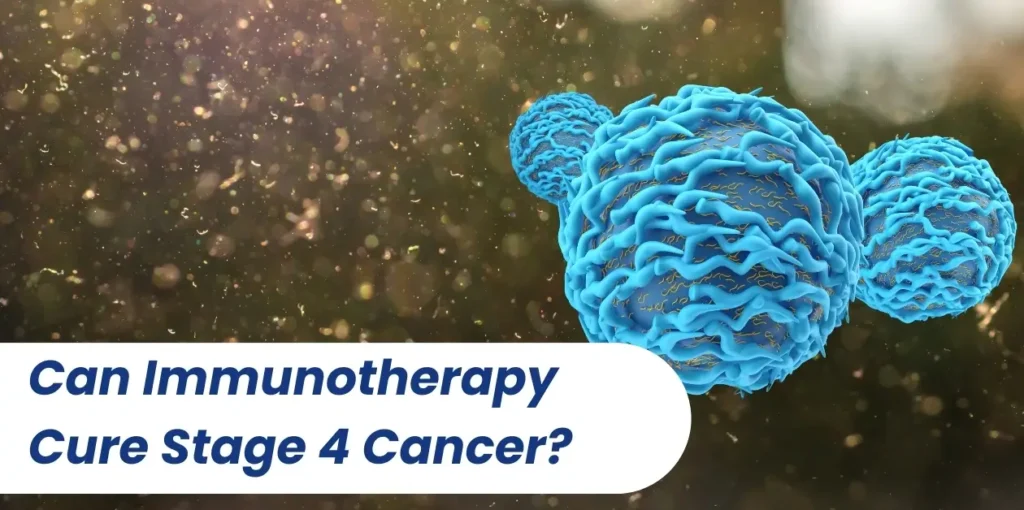Can Immunotherapy Cure Stage 4 Cancer?

Cancer is a formidable adversary, particularly when it reaches stage 4, the most advanced stage. At this point, the cancer has metastasized, spreading to distant parts of the body, making treatment more challenging. Among the various treatment options, immunotherapy has emerged as a promising approach. But can immunotherapy cure stage 4 cancer? Let’s delve into this question, exploring the potential and limitations of this innovative treatment.
Understanding Stage 4 Cancer
Stage 4 cancer, also known as metastatic cancer, signifies that the cancer has spread beyond its original site to other parts of the body. This stage is often associated with a poorer prognosis compared to earlier stages. The symptoms and survival rates vary depending on the type of cancer and the extent of its spread. Traditional treatments like chemotherapy, radiation, and surgery aim to control the disease and alleviate symptoms, but they often fall short of providing a cure at this advanced stage.
What is Immunotherapy?
Immunotherapy is a type of cancer treatment that harnesses the power of the body’s immune system to fight cancer cells. Unlike traditional treatments that directly target cancer cells, immunotherapy works by boosting the immune system’s natural ability to detect and destroy cancer cells. There are several types of immunotherapy, including immune checkpoint inhibitors, CAR T-cell therapy, and cancer vaccines, each with its unique mechanism of action.
How Does Immunotherapy Work?
Immunotherapy has shown remarkable success in treating certain types of cancer, even at advanced stages. For instance, immune checkpoint inhibitors have significantly improved survival rates for patients with advanced melanoma and non-small cell lung cancer. CAR T-cell therapy has been effective in treating certain types of leukemia and lymphoma. These successes have generated hope that immunotherapy could potentially cure stage 4 cancer.1. Immune Checkpoint Inhibitors: These drugs block proteins that prevent the immune system from attacking cancer cells. By inhibiting these checkpoints, the immune system can recognize and destroy cancer cells more effectively.
- CAR T-Cell Therapy: This involves modifying a patient’s T-cells (a type of immune cell) to better recognize and attack cancer cells. The modified T-cells are then infused back into the patient’s body.
- Cancer Vaccines: These vaccines stimulate the immune system to attack specific cancer cells. They can be preventive (like the HPV vaccine) or therapeutic, designed to treat existing cancer.
The Potential of Immunotherapy in Stage 4 Cancer
Immunotherapy has shown remarkable success in treating certain types of cancer, even at advanced stages. For instance, immune checkpoint inhibitors have significantly improved survival rates for patients with advanced melanoma and non-small cell lung cancer. CAR T-cell therapy has been effective in treating certain types of leukemia and lymphoma. These successes have generated hope that immunotherapy could potentially cure stage 4 cancer
Limitations and Challenges
Despite its promise, immunotherapy is not a guaranteed cure for stage 4 cancer. Several factors influence its effectiveness:
- Cancer Type: Immunotherapy is more effective against certain types of cancer. For example, it has shown great success in melanoma and lung cancer but is less effective in others like pancreatic cancer.
- Patient’s Immune System: The effectiveness of immunotherapy depends on the patient’s immune system. A weakened immune system may not respond well to treatment.
- Side Effects: Immunotherapy can cause severe side effects, including inflammation and autoimmune reactions, where the immune system attacks healthy cells.
- Resistance: Some cancers develop resistance to immunotherapy, reducing its effectiveness over time.
Case Studies and Research
Numerous clinical trials and studies are underway to explore the potential of immunotherapy in treating stage 4 cancer. For instance, a study published in the Journal of Clinical Oncology reported that combining immune checkpoint inhibitors with other treatments improved survival rates in patients with advanced melanoma. Another study found that CAR T-cell therapy led to complete remission in a significant percentage of patients with advanced lymphoma.
The Future of Immunotherapy
The future of immunotherapy looks promising, with ongoing research aimed at overcoming its limitations and expanding its applicability. Scientists are exploring combination therapies, where immunotherapy is used alongside other treatments like chemotherapy and targeted therapy, to enhance its effectiveness. Personalized immunotherapy, tailored to the genetic makeup of an individual’s cancer, is another exciting area of research.
Conclusion
While immunotherapy has revolutionized cancer treatment and offers hope for patients with stage 4 cancer, it is not yet a definitive cure. Its effectiveness varies depending on the type of cancer, the patient’s immune system, and other factors. However, ongoing research and clinical trials continue to push the boundaries, bringing us closer to a future where immunotherapy could potentially cure even the most advanced cancers.
In conclusion, immunotherapy represents a significant advancement in the fight against cancer. It has the potential to improve survival rates and quality of life for patients with stage 4 cancer. As research progresses, we may see even more breakthroughs that could transform immunotherapy from a promising treatment into a definitive cure.
References: : Medical News Today. “Is stage 4 cancer curable? Survival rates and outlook.” : Healthline. “Cancer and Immunotherapy: 6 Questions Answered.” : Proventa International. “Immunotherapy for Stage 4 Cancer: Can It Be the Ultimate Cure?” : Healthline. “Treating Stage 4 Melanoma: Immunotherapy, Targeted Therapy, and More.” : Journal of Clinical Oncology. “Combination of Immune Checkpoint Inhibitors in Advanced Melanoma.” : Clinical Trials. “CAR T-Cell Therapy in Advanced Lymphoma.

Dr. A. Venugopal
Clinical Director & HOD Medical Oncology Senior Consultant Medical Oncologist & Hemato-Oncologist
About Author
Dr. A. Venugopal
MD (General Medicine), DM (Medical Oncology), MRCP – SCE Medical Oncology (UK), ECMO (Switzerland).
Dr A. Venugopal is One of the best medical oncologist and Hemato Oncologist in hyderabad, currently serving as the Head of the Department and Senior Medical Oncologist, Hemato Oncologist at Pi Health Cancer Hospital in Gachibowli, Hyderabad. He brings over 15 years of extensive experience in the field of Oncology.
